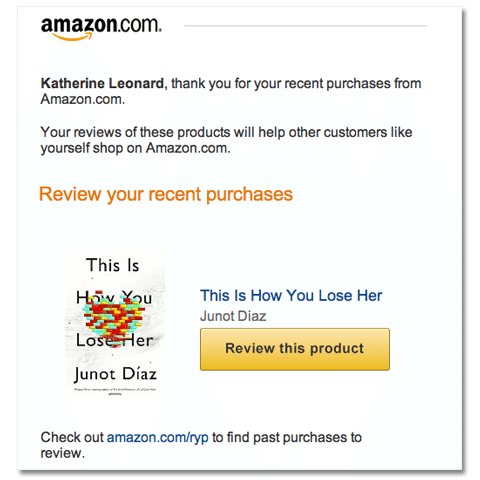With the enormous growth of sites like Amazon and Yelp, reviews have become an increasingly vital component for online sales. In fact, studies show that 94% of marketing and sales professionals rate user-generated content (think reviews and testimonials) as either “very effective” or “extremely effective” in driving sales.
Unfortunately though, convincing customers to pen product reviews is easier said than done. A recent study shows that 90% of consumers are “silently satisfied” – while they are pleased with their overall experience, they don’t share that experience in the form of a product review. As you can imagine, customers neglect the review process for any number of reasons, from the required time commitment to legal or privacy issues.
We spoke with a handful of online retailers, from SaaS companies to independent authors and apparel distributors to find out which review solicitation strategies get the job done.
Automated review requests
The automated email is a fairly common review request strategy – if you’ve done any online shopping, chances are you’ve been asked via email to review your purchase. Amazon sends these reminders multiple times after purchase to solicit reviews. While the reminder is a nice thought, let’s face it: If I’m not the review writing type, a series of pesky and obviously automated reminder emails certainly isn’t going to inspire me to hunker down to write a thoughtful review.

Turn reviews into case studies
Robert Graham, founder of Whitetail Software, recommends offering a business-to-business value proposition to potential review writers. “I like to turn reviews into small case studies where possible,” he says. Reviewers share how your product helped their day-to-day business, and as a result, “you get a review placed where you need it and [their business] gets a mention on your blog as part of a case study.” Graham uses this strategy to collect reviews for his book, and notes a very high response rate.
Turn compliments into reviews
If you have a quality product (of course you do!), you’re bound to field a number of compliments from satisfied customers. When it comes down to it, all it takes to turn these kind remarks into valuable reviews is a simple request. The folks behind StratPad, “the highest-rated strategy and business plan app” in the AppStore, use this strategy to build upon their already positive stack of reviews. “When we get positive feedback from our customers via email or phone we ask them to rate and review us in the App Store,” says Manuela Bizzotto, StratPad’s Director of Communications.
Convert a complaint into a review
By the same token, no matter what kind of glorious product you sell, you’re bound to get the occasional complaint. But as the StratPad team notes, handling these issues correctly can turn disbelievers into product evangelists. “When customers report complaints or problems, our CEO follows up personally and we work with the customer to resolve the issue. We get some of our best reviews from these folks,” says Bizzotto.
Sweepstakes for reviewers
Many customers will require a bit of product-based incentive to take the time to write a thoughtful review. Estelle Puleston, owner of estylingerie.com, uses a monthly giveaway to incentivize customers. “Every month we give away a gift voucher to one person, chosen at random, who has left a product review after their purchase,” says Puleston. “We pop a small card advertising this feature in with every order, too, to make sure it gets spotted.”
Offer educational materials
Don’t feel obligated to give products away though; educational materials can be equally appealing to potential reviewers. Carolyn Howard-Johnson, award-winning author of How To Do It Frugally, encourages readers to review her books by “offering a little perk, like a free white paper or e-book on a related subject.”
Turn the spotlight on reviewers
Simply acknowledging a thoughtful reviewer can serve as positive reenforcement, especially if there is a strong sense of community around your product. Susan Long, President and CEO of Diving Unlimited International, notes that highlighting product reviews – and the reviewer – has helped her company collect hundreds of positive reviews over the years. On the homepage, they call out one “DUI Owner of the Week,” with an image of the diver in their gear. The image links to a review and also gives the diver a chance to share his story with the DUI community. “People are thrilled to be the [reviewer] of the week and we have a waiting list,” says Long. This strategy certainly seems to be working – the diving equipment supply company is currently on its 954th reviewer highlight.
How do you encourage customers to write reviews? Share your strategies below.
